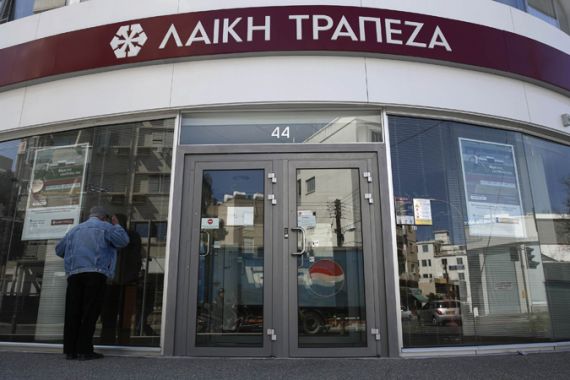Cyprus eases citizenship to soothe investors
President says foreign depositors who lost at least $3.9m due to EU-IMF bailout are eligible to apply for citizenship.

Cyprus has announced it will relax citizen requirements for foreigners, including bank depositors who lost large amounts of money in the deal with the European Union and the International Monetary Fund (IMF).
“Non-resident investors who held deposits prior” to the bailout and lost “at least 3 million euros [$3.9m] will be eligible to apply for Cypriot citizenship,” President Nicos Anastasiades told a Russian business conference in the coastal resort of Limassol on Sunday.
Keep reading
list of 4 itemsA flash flood and a quiet sale highlight India’s Sikkim’s hydro problems
Why is Germany maintaining economic ties with China?
Behind India’s Manipur conflict: A tale of drugs, armed groups and politics
Cyprus was forced to wind down one major bank and impose considerable losses on large depositors in a second bank in return for $13bn in aid from the IMF and EU in a move that was devastating to both Cypriots and foreign investors.
Eurozone finance ministers approved the aid on Friday.
‘Mitigating damage’
Anastasiades said on Sunday his cabinet would this week approve the relaxation of restrictions on citizenship in Cyprus, an EU member since 2004.
Non-resident investors who held deposits prior to March 15, when the plan to impose losses on savers was first formulated, and who lost at least three million euros would be eligible to apply for Cypriot citizenship, he said.
“We believe that a number of measures to be adopted could on the one hand mitigate to some extent the damage the Russian business community has endured,” Anastasiades said.
Other measures were also under consideration, he said, including offering tax incentives for existing or new companies doing business in Cyprus.
Anastasiades, whose centre-right government has been in power for less than two months, said countries who accused Cyprus of being a money laundering hub for businesses from countries such as Russia were being hypocrites, since those same countries were now trying to lure foreign businesses away.
Used to robust growth and a thriving financial services sector, Cyprus is now bracing itself for record unemployment and at least a 12 percent drop in output this year.
Model crumbles
Cyprus, one of the eurozone’s smallest economies, modelled itself as a competitively taxed financial services centre with a network of treaties to avoid double taxation.
That model is now threatened by the fact that bailout conditions have left its two main banks crippled, but also forced Cyprus to increase its corporate tax to 12.5 percent from 10, which had been the lowest in the eurozone.
The bailout, first requested in June 2012, was delayed partly because of concerns expressed by eurozone states, notably Germany, that its financial sector was opaque, thus aiding money laundering.
But Cyprus was neither a money laundering hub or a tax haven, Anastasiades said.
“What saddens, I refrain from using the word angers, me deeply is that since the euro group agreement was reached, some EU partners’ businesses involved in the financial services industry have been preying upon our financial services sector, in order to encourage a relocation of funds into their economies,” he said.
He said it was an irony and an “absurd paradox” that the governments of those businesses claimed those funds were deposited and invested in Cyprus through illicit means.
“I am a firm believer in the rules of the free market, but allow me to comment on the hypocrisy of such methods,” Anastasiades said.